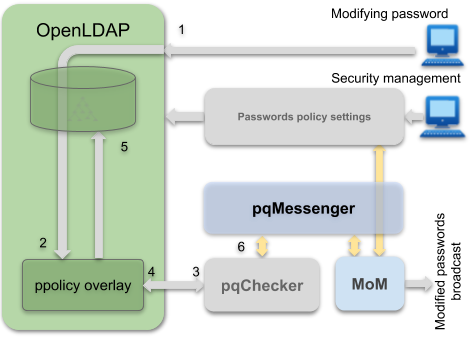The plug-in of OpenLDAP directory server pqChecker,allows to control the passwords content robustness. It exposes, also, a Java compliant programming interface (API). This API allows you to read / modify the operating parameters of pqChecker programmatically. It allows, also, to broadcast the new values of passwords in real time.
The pqMessenger application is a software component that uses this pqChecker programming interface to allow it to communicate with a MoM that supports JMS. So, an application connected to the same MoM must be able to provide the functions:
- View the operating settings of pqChecker
- Modify these password strength settings
- Broadcast, in real time, new values of modified passwords

|
The Security managemet application is able to read and change password quality settings through communication with pqChecker provided by the MoM - pqMessenger chain. For this purpose, this application must be able to communicate with the MoM used by the global system. This operating mechanism makes it possible to manage these settings through a simple interface and without any particular system constraint, such as the need for involving a system administrator On the other hand, if the password broadcast feature is enabled in the pqChecker setup, this settings management application or another connected to the MoM, will be able to receive the new password values in real time as soon as they are modified. This allows to integrate a functionality of synchronization of these values with other systems. So, the real-time synchronization of the passwords can be ensured to LDAP servers of another kind ;-) like MS Active Directory or different systems like database servers. |
pqMessenger is a free and opensource software. It is licensed under the GNU GPL v3+ license.





